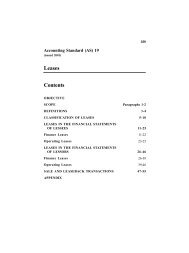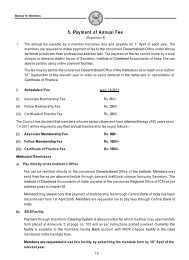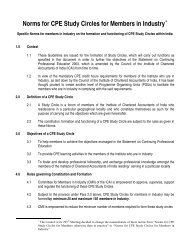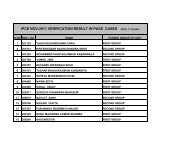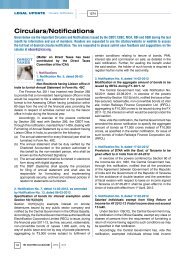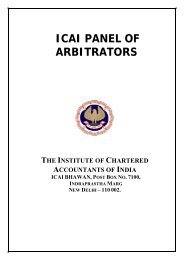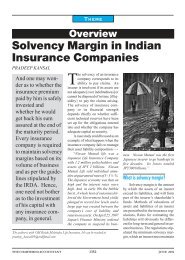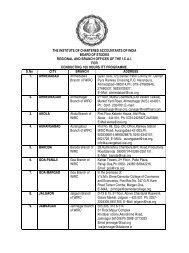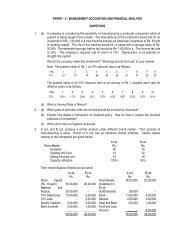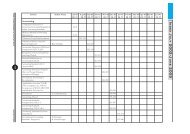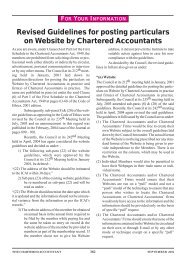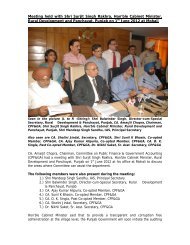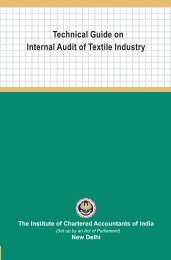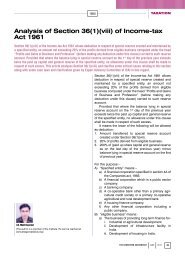The Chartered Accountant
The Chartered Accountant
The Chartered Accountant
Create successful ePaper yourself
Turn your PDF publications into a flip-book with our unique Google optimized e-Paper software.
of the relevant paragraphs when a<br />
qualified opinion is to be expressed:<br />
Basis for Qualified Opinion<br />
<strong>The</strong> Company’s financing arrangements<br />
expire and amounts outstanding are<br />
payable on May 19, 20X1. <strong>The</strong> Company<br />
has been unable to re-negotiate or<br />
obtain replacement financing. This situation<br />
indicates the existence of a material<br />
uncertainty that may cast significant<br />
doubt on the Company’s ability to continue<br />
as a going concern and therefore<br />
the Company may be unable to realize<br />
its assets and discharge its liabilities in<br />
the normal course of business. <strong>The</strong> financial<br />
statements (and notes thereto)<br />
do not fully disclose this fact.<br />
Qualified Opinion<br />
In our opinion, except for the incomplete<br />
disclosure of the information<br />
referred to in the Basis for Qualified<br />
Opinion paragraph, the financial<br />
statements give the information required<br />
by the Companies Act, 1956,<br />
in the manner so required and give a<br />
true and fair view in conformity with<br />
the accounting principles generally accepted<br />
in India:<br />
(a) in the case of the Balance Sheet,<br />
of the state of affairs of the company<br />
as at March 31, 20X1;<br />
(b) in the case of the Profit and<br />
Loss Account, of the profit/<br />
loss for the year ended on that<br />
date; and<br />
(c) in the case of the cash flow<br />
statement, of the cash flows for<br />
the year ended on that date.<br />
A24. <strong>The</strong> following is an illustration<br />
of the relevant paragraphs when an<br />
adverse opinion is to be expressed:<br />
Basis for Adverse Opinion<br />
<strong>The</strong> Company’s financing arrangements<br />
expired and the amount outstanding<br />
was payable on March 31,<br />
20X0. <strong>The</strong> Company has been unable<br />
to re-negotiate or obtain replacement<br />
financing and is considering filing for<br />
bankruptcy. <strong>The</strong>se events indicate a<br />
material uncertainty that may cast significant<br />
doubt on the Company’s ability<br />
to continue as a going concern and<br />
therefore it may be unable to realise<br />
its assets and discharge its liabilities in<br />
the normal course of business. <strong>The</strong> financial<br />
statements (and notes thereto)<br />
do not disclose this fact.<br />
STANDARDS<br />
Adverse Opinion<br />
In our opinion, because of the omission<br />
of the information mentioned in<br />
the Basis for Adverse Opinion paragraph,<br />
the financial statements do not<br />
give the information required by the<br />
Companies Act, 1956, in the manner<br />
so required and also do not give a<br />
true and fair view in conformity with<br />
the accounting principles generally accepted<br />
in India:<br />
(a) in the case of the Balance Sheet,<br />
of the state of affairs of the company<br />
as at March 31, 20X0; and<br />
(b) in the case of the Profit and<br />
Loss Account, of the profit/<br />
loss for the year ended on that<br />
date; and<br />
(c) in the case of the cash flow<br />
statement, of the cash flows for<br />
the year ended on that date.<br />
Use of Going Concern Assumption<br />
Inappropriate (Ref: Para. 21)<br />
A25. If the financial statements have<br />
been prepared on a going concern basis<br />
but, in the auditor’s judgment, management’s<br />
use of the going concern<br />
assumption in the financial statements<br />
is inappropriate, the requirement of<br />
paragraph 21 for the auditor to express<br />
an adverse opinion applies regardless<br />
of whether or not the financial statements<br />
include disclosure of the inappropriateness<br />
of management’s use of<br />
the going concern assumption.<br />
A26. If the entity’s management is required,<br />
or elects, to prepare financial<br />
statements when the use of the going<br />
concern assumption is not appropriate<br />
in the circumstances, the financial<br />
statements are prepared on an alternative<br />
basis (e.g., liquidation basis). <strong>The</strong><br />
auditor may be able to perform an<br />
audit of those financial statements<br />
provided that the auditor determines<br />
that the alternative basis is an acceptable<br />
financial reporting framework in<br />
the circumstances. <strong>The</strong> auditor may be<br />
able to express an unmodified opinion<br />
on those financial statements, provided<br />
there is adequate disclosure therein but<br />
may consider it appropriate or necessary<br />
to include an Emphasis of Matter<br />
paragraph in the auditor’s report to<br />
draw the user’s attention to that alternative<br />
basis and the reasons for its use.<br />
Management Unwilling to Make<br />
or Extend Its Assessment (Ref:<br />
Para. 22)<br />
A27. In certain circumstances, the<br />
auditor may believe it necessary to request<br />
management to make or extend<br />
its assessment. If management is unwilling<br />
to do so, a qualified opinion or<br />
a disclaimer of opinion in the auditor’s<br />
report may be appropriate, because it<br />
may not be possible for the auditor to<br />
obtain sufficient appropriate audit evidence<br />
regarding the use of the going<br />
concern assumption in the preparation<br />
of the financial statements, such<br />
as audit evidence regarding the existence<br />
of plans management has put in<br />
place or the existence of other mitigating<br />
factors.<br />
Material Modifications to<br />
ISA 570, “Going Concern”<br />
Addition<br />
1. In Paragraph 3, the responsibilities<br />
of management to make an assessment<br />
of the entity’s ability to continue<br />
as a going concern have been<br />
made more country specific.<br />
Deletion<br />
1. Paragraph A1 of the Application<br />
Section of ISA 570 deals with the application<br />
of the requirements of ISA<br />
570 to the audits of public sector entities<br />
in the context of going concern<br />
risks that may arise, but are not limited<br />
to, situations where public sector<br />
entities operate on a for-profit basis,<br />
where government support may be<br />
reduced or withdrawn, or in the case<br />
of privatisation. Since as mentioned<br />
in the “Preface to the Standards on<br />
Quality Control, Auditing, Review,<br />
Other Assurance and Related Services”,<br />
the Standards issued by the Auditing<br />
and Assurance Standards Board<br />
apply equally to all entities, irrespective<br />
of their form, nature and size, a<br />
specific reference to applicability of<br />
the Standard to public sector entities<br />
has been deleted.<br />
Further, it is also possible that such a<br />
situation may arise in the case of nonpublic<br />
sector enterprise. Accordingly,<br />
the spirit of erstwhile A1, highlighting<br />
the appropriateness of the going concern<br />
assumption in the preparation<br />
of the financial statements where the<br />
funding arrangements are guaranteed<br />
by the Central Government has been<br />
retained.q<br />
THE CHARTERED ACCOUNTANT 1107 DECEMBER 2008



